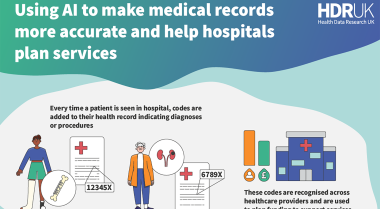A data asset to support multimorbidity research
29 March 2021
Multimorbidity researchers in Swansea have developed a protocol to explore the most deeply phenotyped population cohort in the UK – created by HDR UK investment.

Overview
People often live with more than one health condition. For example, a person could have both diabetes and depression. Multimorbidity broadly refers to the presence of 2 or more health conditions in a single person. Multimorbidity poses several unique challenges including polypharmacy (i.e. the concurrent use of medications) and treatments/guidelines that are centred on individual conditions. Given that multimorbidity is increasingly becoming the norm, particularly in ageing populations, it is now considered a global health issue.
Challenge
Despite its prevalence, multimorbidity remains poorly understood. There is limited data on the burden, determinants, prevention and treatment of multimorbidity. Where data does exist, it is further complicated by the premise that multimorbidity is highly heterogeneous: there are a multitude of condition combinations that people may experience.
Solution
In response to the existing research gaps in multimorbidity, HDR UK’s Jane Lyons and colleagues from across the four nations created a research ready data asset to further understand multimorbidity. The Wales Multimorbidity e-Cohort represents a ‘total population cohort’ including all residents in Wales (i.e. 2.9 million people). The platform combines health, social, and environmental data stored in the Secure Anonymised Information Linkage (SAIL) Databank – whilst protecting participant privacy. Anonymised GP records are complemented with demographic, disease registry, hospital inpatient, outpatient data and laboratory results.
Learnings
This work reinforces the value of a team science approach: the platform is the result of collaboration from many different institutions and disciplines, clinicians, and members of the public from across the UK. What’s more, the study protocol is a nod to open science providing a transparent account of the hypothesis, rationale and methodology of the study – helping to reduce publication bias and improving reproducibility.
Impact and outcomes
The Wales Multimorbidity e-Cohort accelerates the pace of multimorbidity research by removing the need to source, manage, and clean data. It is expected that the evidence gained from large-scale analyses supported by the platform will be critical in informing health policy alongside healthcare planning, prevention, and management of individuals with multimorbidity. What’s more, the platform will contribute data on multimorbidity incidence, prevalence, and burden directly to the Global Burden of Diseases Study – and make multimorbidity phenotypes and algorithms available to the wider research community.



